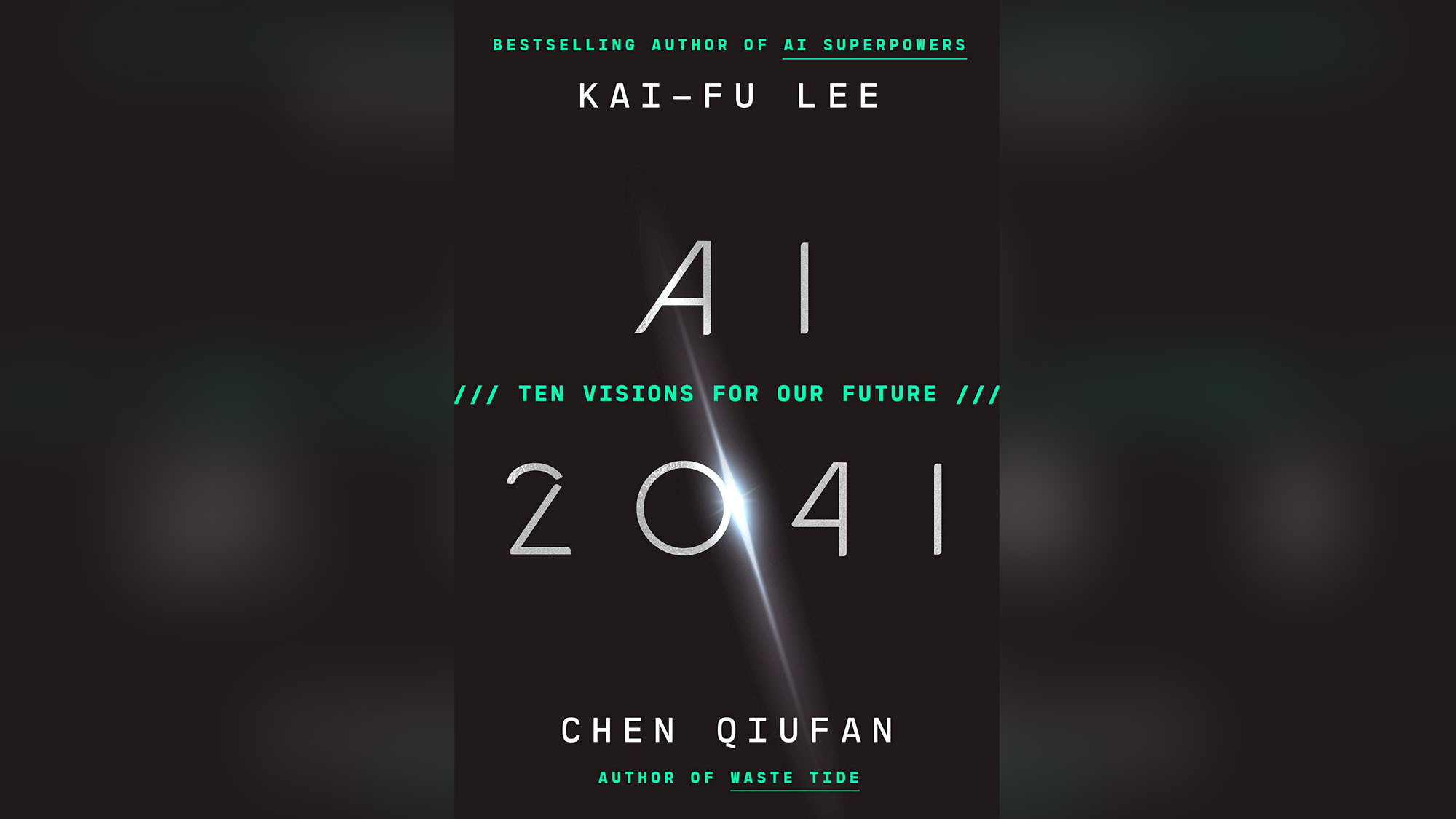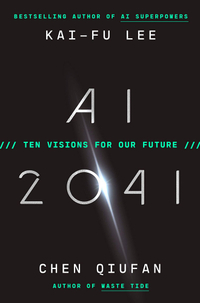
Aside from the unlikely scenario of a Skynet-like incident, the advent of artificial intelligence will bring immeasurable new benefits to humankind as we charge into the next two decades. While the popular Hollywood notion of sinister AI overlords is a cautionary tale, the reality of this burgeoning technology will enhance our planet in ways we're barely able to comprehend.
"AI 2041: Ten Visions For Our Future" (Currency, 2021), a fascinating new sci-fi anthology, ushers us into this brave new world of digital enlightenment on a more upbeat note. Its 480 pages deliver a collection of provocative tales describing how artificial intelligence might touch our lives and loves 20 years from today.
Written by former president of Google China, Kai-Fu Lee ("AI Superpowers"), in partnership with acclaimed sci-fi novelist Chen Qiufan ("Waste Tide"), "AI 2041" acts as an optimistic guide toward an uncertain tomorrow in which next-gen tech melds with society and industry. In these 10 insightful short stories, Lee and Qiufan introduce readers to a variety of eye-opening 2041 settings like Tokyo, Mumbai, San Francisco, Munich and Seoul.
Related: Best space and sci-fi books for 2021
AI 2041: 10 Visions For Our Future | $25.49 from Amazon
In this provocative, utterly original work, Kai-Fu Lee, the former president of Google China and bestselling author of AI Superpowers, teams up with celebrated novelist Chen Qiufan to imagine our world in 2041 and how it will be shaped by AI.
According to a Currency statement, AI will become the defining societal development of the 21st century. The authors hypothesize that within two decades, most aspects of daily human life will be totally unrecognizable. AI will spawn unprecedented wealth, revolutionize medicine and education through human-machine symbiosis, and create fresh forms of communication, weaponry and entertainment.
Space.com connected with Qiufan to learn more about humankind's wariness of AI and how its emergence will challenge the organizing principles of economic and social structure. This interview has been edited for length and clarity.
Space.com: Why do humans have such distrust of AI and where did the anxiety originate?
Get the Space.com Newsletter
Breaking space news, the latest updates on rocket launches, skywatching events and more!
Chen Qiufan: I think the root of this fear or anxiety comes from the false imagination of the others, a projection of hostility, an apprehension of the unknown. It has appeared countless times in history: the Crusades, the Age of Sail, the U.S.-Soviet Cold War, 9/11, and so on. In the case of AI, the externalities of misuse, the amplification of the bias in the data sets, and the unexplainability and incomprehensibility of the technology itself, will all lead to the negative response and imagination from the mass.
Space.com: What specific elements of advanced AI are you most excited about?
Qiufan: Firstly, AI can predict a lot of things based on the existing dataset, such as protein structures, wildfire hot spots, mapping the brain connectomes, etc. It will fundamentally change the way of current science research and experiment. It's definitely a paradigm shift.
Secondly, if we are able to find a way to teach AI to learn using small data, just as the human brain does, rather than endlessly scaling up the data and computation power, I believe it might be the path leading to AGI [Artificial General Intelligence], and of course, more sustainable for our environment.
Last but not least, I am really excited about how AI could help to reveal some fundamental principles and patterns in sociology, psychology, archaeology and more humanities disciplines. It will help us better understand ourselves as a civilization and as a species.
Space.com: How does "AI 2041's" union of visionary storytelling and informative summaries best present this timely topic?
Qiufan: I think I've seen enough dystopian futures in science fiction across different mediums. No matter how close they imagine and reflect reality. Both Kai-Fu [Lee] and I felt that there is urgency to deliver a much more optimistic and plausible portrait of the future. Because if we want to create a future we live in, we must first learn to imagine it. That's how mankind builds up consensus and convergence. So we chose to blend the futuristic narrative together with the solid analysis and explanation to help people understand why and how AI is supposed to be created as a helper rather than terminator.
Space.com: Is there one tale in this collection that best reveals your hopes for AI's future?
Qiufan: All of them reflect a little bit of hopes and dreams. But particularly, I will say that the final story, "Dreaming of Plenitude," will be the most idealistic one. It imagines a future society which, with the help of AI, already reaches carbon neutrality using an abundance of green energy.
People are living in the post-scarcity status, no more hunger and poverty, with the incentive of virtual currency not based on property but esteem, love, belonging and self-actualization. I know it sounds like "Star Trek" and might not happen any sooner in the near future. But I think we still need to hold on to those kinds of high hopes and to design better technologies and societies for all mankind, not just for the super-rich or privileged class.
Here's an excerpt from Kai-Fu Lee and Chen Qiufan's "AI 2041: Ten Visions For Our Future."
Chapter One: The Golden Elephant
Story translated by Blake Stone-Banks
It is better to live your own destiny imperfectly than to imitate somebody else's perfectly.
—Bhagavad Gita (भगवद्गीता, Song of God or Hindu Scripture) chapter 3, verse 35
Note from Kai-Fu: The opening story takes readers to Mumbai, where we meet a family who has signed up for a deep-learning-enabled insurance program. This dynamic insurance program engages with the insured in the form of a series of apps intended to better their lives. The family's teenage daughter, however, finds that the AI program's persuasive nudges complicate her search for love. "The Golden Elephant" introduces the basics of AI and deep learning, offering a sense of its main strengths and weaknesses. In particular, the story illustrates how AI can single-mindedly try to optimize certain goals, but sometimes create detrimental externalities. The story also suggests the risks when one company possesses so much data from its users.
On the screen, the three-story statue of Ganesh swayed in the surf of Chowpatty Beach as though synced to the sitar soundtrack. With each wave, the towering idol descended lower until it was engulfed by the Arabian Sea. In the salty brine, the statue dissolved into gold and burgundy foam, washing onto Chowpatty Beach, where the colors clung like blessings to the legions of believers who had gathered for the Visarjan immersion ritual celebrating the end of the Ganesh Chaturthi festival.
In her family's Mumbai apartment, Nayana watched as her grandparents clapped their hands and sang along to the TV. Her younger brother, Rohan, took a mouthful of cassava chips and a deep swig from his diet cola. Though he was only eight, Rohan was under doctor's orders to strictly control his fat and sugar intake. As he wagged his head in excitement, crumbs sprayed from his mouth and flew across the floor. In the kitchen, Papa Sanjay and Mama Riya banged on pots and crooned like they were in a Bollywood film.
Nayana tried to shut them all out of her mind. The tenth-grader was instead focusing all her energy on her smartstream, where she had downloaded FateLeaf. The new app was all Nayana's classmates could seem to talk about lately. It was said to possess the answer to almost any question, thanks to the prescience of India's greatest fortune tellers.
The app — its branding and ad campaign made clear — was inspired by the Hindu sage Agastya, who was said to have engraved the past, present, and future lives of all people in Sanskrit onto palm leaves, so-called Nadi leaves, thousands of years ago.
According to the legend, simply by providing one's thumbprints and birthdate to a Nadi leaf fortune teller, a person could have their life story foretold from the corresponding leaf. The problem was that many leaves had been lost to meddling colonialists, war, and time. In 2025, a tech company tracked down and scanned all the known Nadi leaves still in circulation. The company used AI to perform deep learning, auto-translation, and analysis of the remaining leaves. The result was the creation of virtual Nadi leaves, stored in the cloud — one for each of the 8.7 billion people on Earth.
Nayana was not dwelling on the ancient history of the Nadi leaves. She had a more pressing matter on her mind. Users of the FateLeaf app could seek to uncover the wisdom of their Nadi leaf by posing various questions. While her family watched the Ganesh Visarjan celebration on TV, Nayana nervously typed out a question within the app: "Does Sahej like me?" Before she clicked "Send," a notification popped up indicating that an answer to her question would cost two hundred rupees. Nayana clicked "Submit."
Nayana had liked Sahej from the moment his stream first connected in their virtual classroom. Her new classmate didn't use any filter or AR background. Behind Sahej, hanging on the wall, Nayana could see rows of colorful masks, which, she learned, Sahej had carved and painted himself. On the first day of the new term, the teacher had asked Sahej about the masks, and the new student shyly gave a show-and-tell, explaining how the masks combined Indian gods and spirits with the powers of superheroes.
Now, in an invitation-only room on her ShareChat, some of Nayana's classmates were gossiping about Sahej. From the way his room was furnished to the fact that his surname was hidden from public view in school records, these girls were certain Sahej was among the "vulnerable group" that the government mandated make up at least 15% of their student body. At private schools across India, such children were practically guaranteed spots and their tuition, books, and uniforms were covered by scholarships. "Fifteen percent" and "vulnerable group" were euphemisms for the Dalits.
From documentaries she had watched online, Nayana knew about India's old caste system, which was deeply embedded in Hindu religious and cultural beliefs. A person's caste had once determined one's profession, education, spouse—their whole life. At the bottom rung of this system were the Dalits, or, as they were sometimes referred to with derision, "untouchables." For generations, members of this community were forced to do the dirtiest jobs: cleaning sewers, handling the corpses of dead animals, and tanning leather.
The constitution of India, ratified in 1950, outlawed discrimination based on caste. But for years following independence, Dalit areas for drinking, dining, residing, and even burial were kept separate from those of groups considered higher in the system. Members of the higher castes might even refuse to be in the same room as the Dalits, even if they were classmates or colleagues.
In the 2010s, the Indian government sought to correct these injustices by establishing a 15% quota for Dalit representation in government positions and in schools. The well-intentioned policy had sparked controversy and even violence. Higher-caste parents complained that such admissions weren't based on academic performance. They argued that their children were paying the price for previous generations' sins and that India was just trading one form of inequality for another.
Despite these pockets of backlash, the government's efforts seemed to be working. The 200 million descendants of Dalits were integrating into mainstream society. It had become more difficult to recognize their past identity at a glance.
The girls in Nayana's ShareChat couldn't stop talking about the new boy in school, Sahej, debating his background — but also whether they would consider going out with him.
You shallow snobs, Nayana silently huffed.
For her part, Nayana saw in Sahej a kindred artistic spirit. Inspired by Bharti Kher, Nayana dreamed of becoming a performance artist, and she often had to explain that this was nothing like being a superficial pop entertainer. She believed great artists had to be brutally honest about their innermost feelings and should never accept the perspectives of others. If she liked Sahej, then she liked Sahej — no matter his family background, where he lived, or even his Tamil-accented Hindi.
The question Nayana had posed to the FateLeaf app seemed to take forever to process. Finally, a notification popped up on Nayana's smartstream accompanied by a palm leaf icon: "What a pity! Due to insufficient data provided, FateLeaf cannot currently answer your query."
The clink of Nayana's refund vibrated from her smartstream.
"Insufficient data!" Nayana silently cursed at the app.
Annoyed, she finally raised her head from her screen to notice her mother, Riya, putting the finishing touches on dinner. Something was off. In addition to a number of Indian holiday delights, Nayana saw several super-expensive dishes from a Chinese delivery place on the table. Such treats were rare for her penny-pinching father. But there was something even more unusual: Riya was wearing her favorite pure silk Parsi-style sari. She had her hair up and was wearing a complete set of jewelry. Even Nayana's grandparents seemed different — happier than usual — and for once, her fat brother, Rohan, wasn't pestering her with all kinds of stupid questions.
The Ganesh Chaturthi festival couldn't explain all this.
"So, is anyone going to tell me what's going on?" Nayana said as she stared at the spread on the table.
"What do you mean, what's going on?" Riya shot back.
"Am I the only one who thinks all this is a bit out of the ordinary?"
Nayana's parents glanced at each other for a second then burst out laughing.
Excerpted from "AI 2041" by Kai-Fu Lee and Chen Qiufan Copyright © 2021 by Kai-Fu Lee. Excerpted by permission of Currency, an imprint of Random House, a division of Penguin Random House LLC. All rights reserved.
Follow us on Twitter @Spacedotcom and on Facebook.
Join our Space Forums to keep talking space on the latest missions, night sky and more! And if you have a news tip, correction or comment, let us know at: community@space.com.

Jeff Spry is an award-winning screenwriter and veteran freelance journalist covering TV, movies, video games, books, and comics. His work has appeared at SYFY Wire, Inverse, Collider, Bleeding Cool and elsewhere. Jeff lives in beautiful Bend, Oregon amid the ponderosa pines, classic muscle cars, a crypt of collector horror comics, and two loyal English Setters.










